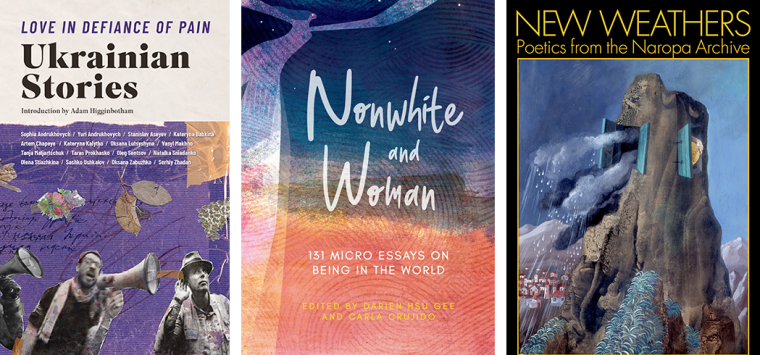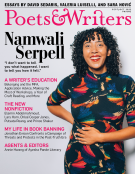Among the many new books published each season is a shelf full of notable anthologies, each one showcasing the work of writers united by genre, form, or theme. The Anthologist highlights a few recently released or forthcoming collections, including Nonwhite and Woman: 131 Micro Essays on Being in the World.

The “courage, humor, and resilience” of Ukrainians, on display for the world to see since the Russian invasion six months ago, is characteristic of a people whose land has been “swept repeatedly by war, famine, and genocide,” writes Andrew Higginbotham in his introduction to Love in Defiance of Pain: Ukrainian Stories (Deep Vellum, September 2022). In this collection of eighteen narratives, mostly fiction, Ukrainian writers pay homage to the human spirit that prevails despite suffering. The volume’s title comes from the opening story—“The Ukraine” by Artem Chapeye, translated into English by Zenia Tompkins—which explores an ill-fated romance the narrator compares to his strained relationship with Ukraine itself. Other stories include Kateryna Kalytko’s “Vera and Flora,” a tale of magic amid wartime plague; Vasyl Makhno’s “Brooklyn, Forty-Second Street,” which follows the travails of two Ukrainian expats in New York City; and “The Bell,” an excerpt from journalist Stanislav Aseyev’s memoir recounting his imprisonment after Russia-backed separatists seized the Donbas region in 2014. Edited by Ali Kinsella, Tompkins, and Ross Ufberg, Love in Defiance of Pain gathers translated works that have previously appeared in U.S. publications—including the New Yorker and Words Without Borders—as well as those appearing for the first time, offering a “kaleidoscope of contemporary Ukrainian voices,” Higginbotham writes.
“Women of color grapple with a sense of identity and belonging, of trying to make sense of who we are and how our cultural and/or ethnic heritage impacts our navigation through life,” writes novelist and poet Darien Hsu Gee in her introduction to Nonwhite and Woman: 131 Micro Essays on Being in the World (Woodhall Press, September 2022), which she edited with writer Carla Crujido. That grappling is at the heart of this collection of poetry and flash nonfiction—each piece three hundred words or less—by women writers of color, including Hala Alyan, Safia Elhillo, Deesha Philyaw, Grace Talusan, and Jane Wong. But the collection also represents a triumph, taking its title and epigraph from Lucille Clifton’s poem “won’t you celebrate with me,” the final lines of which have become a rallying cry for survival in the face of racism and misogyny: “come celebrate / with me that everyday / something has tried to kill me / and has failed.” Entries in this collection chart the difficult terrain of immigration, colorism, and financial struggles alongside the joys of family connection, food, and friendship. “When the body fails, the spirit rises,” writes Anita Johnson in her piece “Combative.” In her forward, Claudia Femenías, a Spanish professor who lives in North Carolina, praises Nonwhite and Woman for creating “a spaciousness for the voices of women from a wide spectrum of ethnicities and cultures to be heard.”
The Summer Writing Program at Naropa University has drawn some of the country’s most innovative writers since its inaugural year in 1974, when Amiri Baraka, Allen Ginsberg, Anne Waldman, and others gathered on the Boulder campus to “revolutionize the act of creative writing.” New Weathers: Poetics From the Naropa Archive (Nightboat Books, October 2022) gathers lectures transcribed from the Summer Writing Program’s audio collection, offering a compendium of thought on experimental poetry as both an artistic practice and a way to “wake the world up to itself,” editors Waldman and Emma Gomis write in their introduction. Organized in five sections addressing poetry’s intersection with a range of subjects—Sanctuary and Apocalypse, Ecopoetic Attentions, Communal Action, Identity in the Capitalocene, and Against Atrocity—the volume compiles lectures by Baraka and Ginsberg as well as contemporary avant-garde poets such as Fred Moten, Eileen Myles, Alice Notley, and Roger Reeves. Evocatively titled entries include “Racoon Magic” by Ariana Reines, “Lecture on Native American Cosmologies” by Harry Smith, and “Loss and Language” by M. NourbeSe Philip, among dozens of others. “We hope this book will make you feel like you’re not alone,” Gomis and Waldman write. “It’s aim is to weave an intergenerational connectivity that serves to unite us.”








